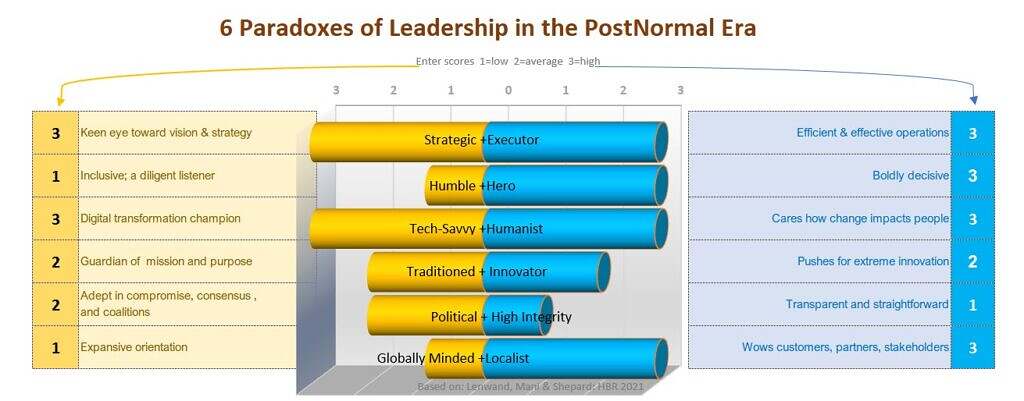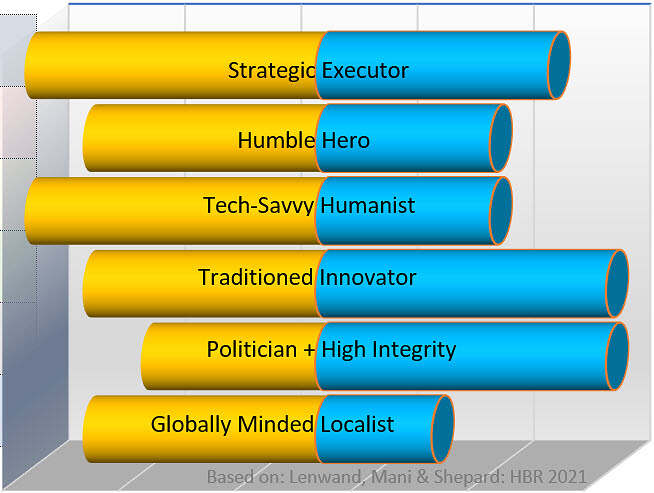6 Leadership Paradoxes for the Post-Pandemic Era
by Paul Leinwand, Mahadeva Matt Mani, and Blair Sheppard
Summary.
To succeed in the post-pandemic era, leaders need new skills and capabilities, leaders must be proficient across a wide set of paradoxical characteristics. Leaders must be strategic executors, balancing vision with execution. Second, they must be humble heroes, willing to make bold decisions while being great listeners and champions of inclusivity. Third, they must be tech-savvy humanists, adopting new technologies while understanding and caring for their people. Fourth, they must be traditioned innovators, preserving the mission and purpose of their companies while pushing innovation to the extreme. Fifth, they must be high-integrity politicians, willing to compromise, accrue support, and form coalitions while doing so with the utmost integrity. Finally, they must be globally-minded localists, expanding their reach while also looking for privileged insights into their own customers.
The pandemic has accelerated a trend that has been unfolding over the last decade. As the world has grown more digital and complex, the range of decisions that leaders need to make has broadened, spanning from big picture strategic thinking to careful execution, to advancing technology roadmaps and upskilling and engaging employees. And decision-making criteria too have expanded, increasingly focusing on ESG considerations in addition to narrowly defined profit expectations. The past year has been particularly intense, pushing leaders to make decisions for which they had no previous experience — and do so quickly.
To succeed in this new era of value creation, leaders need new skills and capabilities. Our in-depth research of more than a dozen companies that have transformed and positioned themselves for success in this new world — including Microsoft, the Cleveland Clinic, and Philips — shows that leaders at these companies sought to be proficient across a wide set of characteristics rather than relying solely on their areas of strengths. They learned how to work together with others who have different backgrounds and different ways of thinking, and they emphasized collaborating together to lead their business despite all their differences. (If you’re interested in participating in a survey about leadership, you can find more details at the end of this article.)
The characteristics that leaders we interviewed considered most important in this new era align well with the six paradoxes of leadership described in Blair Sheppard’s recent book, Ten Years to Midnight.
Strategic Executor
Leaders who want to succeed in this complex and fast paced business environment need to have clarity about what the new world will look like and what their company’s place in that world is going to be. This requires highly strategic leaders, visionaries who can step back from the day to day to see where the world is headed, understand how value can be created in the future in ways that are different from today’s, and stake out a powerful position for the company.
Being a good strategist, however, isn’t enough. Leaders need to be equally skilled at execution. They need to own the transformation of the company needed to reach the future. They need to be able to translate strategy into specific executional steps and see that execution through to the end. They need to be able to make rapid operational decisions that help deliver the path to the future.
In many ways, the digital model of value creation may require even stronger execution skills than in the past, since there is so much to do to push the limits of what’s possible.
Humble Hero
The digital age calls for hero leaders, people who are willing to make bold decisions (like shedding certain business positions or staking out new ones) in times of uncertainty.
At the same time leaders need to have the humility to acknowledge what they don’t know and to bring on board people with potentially very different skills, backgrounds, and capabilities. They need to be willing to learn from others who may have less leadership tenure, but more relevant insights. They need to be highly inclusive and great listeners to understand not only new technologies, but also new ways of doing things that are different from how they did it before.
Tech-Savvy Humanist
While in the past, leaders may have gotten away with delegating the company’s technology challenges to their Chief Information or Chief Digital Officer, that approach will no longer work. With technology being an essential enabler for almost everything a company does — innovation, product management, operations, sales, customer service, finance, or any other area — every leader needs to understand what technology can do for the company and how.
At the same time, they also need to understand and care about people. They need to understand how technology impacts people’s lives and they need to help their people adapt to and adopt the many changes that technology will enforce. This means engaging people with a huge degree of empathy and authenticity — helping them to embrace the changes and co-own the transformation.
Traditioned Innovator
Company purpose and values have probably never been as important as they are today in a world of constant change and multiple disruptions.
In the midst of uncertainty, having clarity of purpose and values helps guide organizations through their path to value creation and relevance. While leaders reimagine their company’s place in the world, they also need to be clear and grounded about who they are as a company. They need to be clear about the organization’s reason for being — its purpose and values — to guide how they will uniquely create value in a way that engages others in their ecosystems and is relevant in the future.
At the same time, leaders need to innovate and try out new things — faster than at any time before. They need to have the courage to fail and allow others to fail as well. All this experimentation and innovation, however, must not be unbound — it must happen within the guardrails consistent with the company’s purpose.
High-Integrity Politician
In an ecosystem world where companies, institutions, and individuals must collaborate to create value, being able to accrue support, negotiate, form coalitions and partnerships, and overcome resistance is an essential leadership capability.
Leaders need to make compromises, be flexible in tweaking their approach and go one step back to be able to move two steps forward. This way of operating, however, can only be successful if leaders establish trust and integrity as the bedrock of all their actions. Effective collaboration within ecosystems can only happen when the parties involved can trust one another. Customers are willing to share privileged insights and participate in ecosystems only when they can trust how their data is used and how they are treated.
And integrity will be key for managing the increasing regulatory scrutiny many companies are going to see. In a data-driven economy, integrity and trust are essential foundational conditions. These are values that cannot come from a computer — they require human leaders to make deliberate choices measured by their actions and words.
Globally-Minded Localist
Technology has erased many boundaries and distances — it’s much easier now to reach customers on the other side of the globe and to collaborate with people from far apart.
Almost by force, companies operating in the digital age need to think globally — even if only to gain access to insights and talent to serve local needs. This requires leaders who can think and engage globally, who will expose themselves to new thinking and work with people from all around.
At the same time, leaders in the digital age also need to be deeply aware of and responsive to the situation and preferences of individual customers and to the local communities and ecosystems in which they operate. Customers, partners, and institutions expect companies to be responsive to their specific needs, and leaders will certainly have to adopt a locally conscious mindset.
While this list is by no means exhaustive, we believe it provides a good starting guide to negotiate the era that lies ahead. The digital age and the magnitude of the transformation that is needed requires that leaders build on their strengths and expand their aperture to manage the complex world we’re living in. We believe those leaders who have the humility, courage and commitment to reinvent themselves will become the champions of the digital age.
_______________________
Authors:
- Paul Leinwand is the global managing director for capabilities-driven strategy and growth at Strategy&, PwC’s strategy consulting business. He is a principal with PwC U.S., an adjunct professor of strategy at the Kellogg School, and the coauthor of several books, including Strategy That Works: How Winning Companies Close the Strategy-to-Execution Gap (HBR Press, 2016) and the upcoming Beyond Digital: How Great Leaders Transform Their Organizations and Shape the Future. (HBR Press, 2021).
- Mahadeva Matt Mani leads the transformation platform for PwC and Strategy&, advising executives on business model transformations and operational value creation and productivity programs. He is a U.S. principal currently on secondment to PwC Netherlands, and the co-author of the upcoming book Beyond Digital: How Great Leaders Transform Their Organizations and Shape the Future. (HBR Press, 2021)
- Blair Sheppard is the global leader of strategy and leadership for the PwC network. He leads a team that is responsible for articulating PwC’s global strategy across 158 countries and the development of current and next-generation PwC leaders. He is professor emeritus and dean emeritus of Duke University’s Fuqua School of Business, and is based in Durham, N.C. He is the author of Ten Years to Midnight: Four Urgent Global Crises and Their Strategic Solutions.
_________________________________________________________________________
Bonus!
Download this worksheet for scoring & creating graphical profiles like this:








